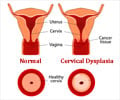When the first vaccine against the virus that causes cervical cancer was launched last year, many women were excluded from being potential beneficiaries because of their age.
Gardasil, produced by US-based drug company Merck & Co, can only be administered to women up to the age of 26.But health experts noted that it was also necessary to immunize older women especially since cervical cancer usually affects women when they are between 30 and 50 years old.
"The risk of cervical cancer increases with age, affecting women at the prime of their lives," said Diane Harper, an oncologist and professor at the Department of Women's and Gender Studies in Dartmouth College.
In the recent Asian launch in Manila of a second vaccine that has the potential to prevent cervical cancer in women over 30, Harper said the availability of such a medicine "marks the beginning of a new era in the future management of cervical cancer in the population of older women".
She said that based on studies, there would be a more significant reduction in the number of cervical cancer cases if women up to the age of 50 years were vaccinated against the HPV types that causes the disease.
Harper has worked with Belgium-based pharmaceutical company GlaxoSmithKline (GSK) to develop Cervarix, a vaccine that can be administered to women up to 50 years old to protect them against the HPV types that causes cervical cancer.
Advertisement
Cervarix, currently available in Australia, the United Arab Emirates and Kenya, has been tested in more than 18,000 females in clinical trials. It protects women against HPV types 16 and 18, which together cause more than 70 percent of all cervical cancers.
Advertisement
GSK said it has yet to finalize the price in the Philippines and other Asian countries, where many women might not be able to afford $300.
Cecilia Ladines-Llave, head of the Cancer Institute at the University of the Philippines, urged governments to consider subsidizing immunization to be able to cover more beneficiaries.
"A vaccine with the potential to protect both young and older women against the main causes of cervical cancer represents a significant milestone in women's health and is wonderful news for Filipino women and women across Asia," she said.
Every year, some 266,000 women are diagnosed with cervical cancer in Asia, and more than half of them die. The disease is the second most common female cancer in the region, where a woman dies of cervical cancer every four minutes.
In the Philippines, 6,000 women develop cervical cancer and 4,300 die from the disease. With about two-thirds of cases diagnosed in the advanced stages when mortality is high, 56 percent of Filipino women with cervical cancer will die within five years from the time of diagnosis.
"All women are at risk of developing cervical cancer," Llave warned. "While most HPV infections clear up annually, some remain and may develop changes in the cervical cells that may lead to cervical cancer, often after many years and without warning signs."
Source-IANS
SRM/S











